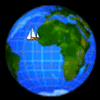Richard Konkolski - Knihy Konkolski s.r.o.
|
| DOMŮ |
|
|
FILMY-DVD | TELEVIZE | ROZHLAS | ČLÁNKY | SEDM MOŘÍ | SÓLO SAILING |
|
|
|
|
||
Voyages of Discovery of the Romans.Consequences of the Fall of the Roman Empire. Under the reign of Augustus a Roman fleet sailed round the promontory of Skagen. About sixteen years after the birth of Christ they discovered the Island of Fionia or Funen, and probably have reached the entrance of the Gulf of Finland. In the year 84 A.C. Julius Agricola, the conqueror of Britain, sailed for the first time round Scotland, and discovered the Orcadian Isles. In Pliny's time the real magnitude of the earth was still so little known that according to the calculations of that great naturalist, Europe occupied a third, Asia only a fourth, and Africa about a fifth of the whole world. The geographer Ptolemy, who lived about the middle the second century, under the reigns of Hadrian and Marcu Aurelius, describes the limits of the earth as far as they were known in his time. To the west, the coast of Africa had been explored as far as Cape Juby; and the Fortunate Islands or Hesperides, the present Canaries, rose from the ocean as the last lands towards the setting sun. To the north discovery had reached as far as the Shetland Isles, and the promontory Perispa at the entrance of the Gulf of Finland; while on the east coast of Africa Cape Brava former the ultimate boundary of the known world. Soon after Ptolemy's time the whole coast of Malacca (Aurea Chersonesus) and the Siamese Sea, as far as the Cape of Cambogia (Notium promontorium), was explored, and the Romans even appeared to have had some knowledge of the great islands of the Indian archipelago, Java, Sumatra, and Borneo. It may well be asked whether the Phoenicians had not embraced a wider horizon than the Romans in the full zenith of their fortune. Even though we reject the circumnavigation of Africa under Necho, it is quite certain that they had explored the west coast of Africa to a much greater extent than the Romans and extremely probable that they knew at least as much of the lands which bound the Indian Ocean. But, because of their narrow-minded mercantile policy, they kept many of their discoveries profoundly secret and all knowledge of them perished with their ruin. In ancient times, when the defeat of a people too often led to its complete destruction, too often the useful discoveries were erased from the memory of mankind. When the western Roman Empire succumbed to the barbarians of the North, the bands which for centuries had united the cities of the east and west were violently separated. Civilization vanished from the lands which had so long been flourishing, only to dawn again after a long and obscure night. Commercial intercourse ceased between the sea-ports of the Mediterranean. All communication with distant countries was cut off, and the boundaries of the known earth became more and more narrow, as the ignorance of a barbarous age increased. Back to Maritime Discovery |
||||||||||||||||||||||||
|
||||||||||||||||||||||||


